What Japan did in WWII - Indonesia
This series is from a local TV program in Japan to get closer to the real facts of WWII. For more detail, go to the prologue.http://yellowpeep.blogspot.com/2005/12/what-japan-did-in-wwii-malaysia.html
Narator: Here we landed Jakarta, the capital of Indonesia, which reminds you of the influence of Holland. Indonesia was a colony of Holland for 350 years since the end of 15th century. Japan took over Indonesia from 1942 to 1945.
 Narator: We visited a national junior high school in which second grade students study Indonesian history. The contents of today's class is WWII. It get started with why Japan expanded overseas.
Narator: We visited a national junior high school in which second grade students study Indonesian history. The contents of today's class is WWII. It get started with why Japan expanded overseas.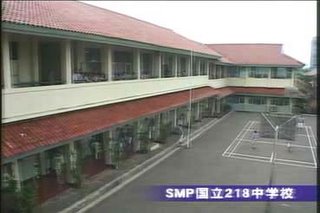 Teacher Nasa: The reason why Japan became imperialized was the fact that Japan was in need of resources as it developed in industory. Japan started colonizing neighboring countries and exploited raw materials. According to the notion from Shinto, Japanese religion, they looked down on other countries, which was the way they esteem themselves.
Teacher Nasa: The reason why Japan became imperialized was the fact that Japan was in need of resources as it developed in industory. Japan started colonizing neighboring countries and exploited raw materials. According to the notion from Shinto, Japanese religion, they looked down on other countries, which was the way they esteem themselves.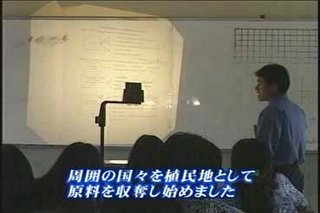 Narator: There is no system that screens history textbooks in contrast to Japanese case. The textbook we obatained today described the Japanese aim, using a Japanese slogan "Hakko-Ichiu", that intended to rule the world, considering the entire Asia one region.
Narator: There is no system that screens history textbooks in contrast to Japanese case. The textbook we obatained today described the Japanese aim, using a Japanese slogan "Hakko-Ichiu", that intended to rule the world, considering the entire Asia one region. Teacher Nasa: Japan succeeded in colonizing south asisan countries in a short term. Indonesia was one of them. Allied nations such as Holland or Britain were defeated. Holland agreed to the capitulation in Kalidjati (Kalijati) in 1942.
Teacher Nasa: Japan succeeded in colonizing south asisan countries in a short term. Indonesia was one of them. Allied nations such as Holland or Britain were defeated. Holland agreed to the capitulation in Kalidjati (Kalijati) in 1942.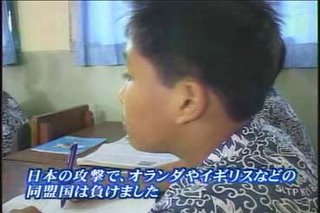 Teacher Nasa: The people welcomed Japanese troops because ...
Teacher Nasa: The people welcomed Japanese troops because ...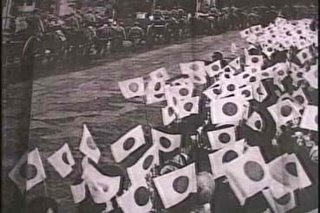 Teacher Nasa: "We are not going to colonialize Indonesia. We've come to liberate you from Europe," said general Harada. Therefore, the people believed Japan.
Teacher Nasa: "We are not going to colonialize Indonesia. We've come to liberate you from Europe," said general Harada. Therefore, the people believed Japan.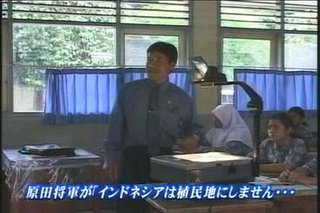 Narator: The history textbook described that Japanese introduced five-year compulsory education which had never been tried in Indonesia, organized Seinen-dan (group for youngers) or Keigo-dan (self-defencers) to prep war, recruited soldiers, exploited manpower, taught them Japanese decipline, or made them sing Japanese national anthem and martial music.
Narator: The history textbook described that Japanese introduced five-year compulsory education which had never been tried in Indonesia, organized Seinen-dan (group for youngers) or Keigo-dan (self-defencers) to prep war, recruited soldiers, exploited manpower, taught them Japanese decipline, or made them sing Japanese national anthem and martial music. 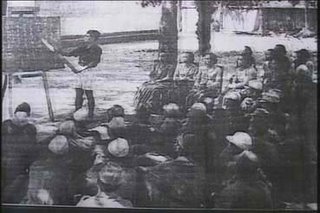
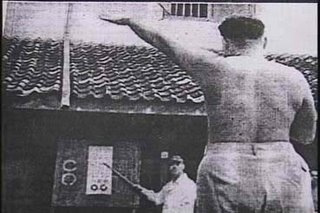
Teacher Nasa: We can find pros and cons in Imperial Japan.
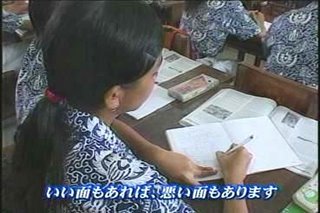 Teacher Nasa: Indonesia has a history as a colony of Japan. Without this period, our independence would have been delayed.
Teacher Nasa: Indonesia has a history as a colony of Japan. Without this period, our independence would have been delayed.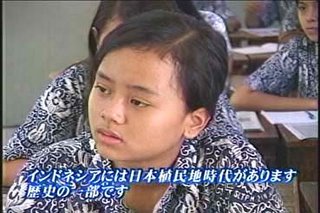 Teacher Nasa: The history under Japan allows us to live as we are. Think positive and forget about your resentment. It is important now to study it as it is, not to repeat the same thing.
Teacher Nasa: The history under Japan allows us to live as we are. Think positive and forget about your resentment. It is important now to study it as it is, not to repeat the same thing.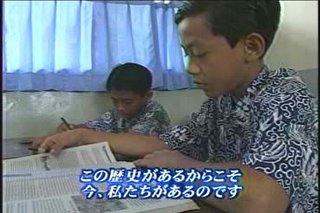 Narator: We asked students what they think of the Japanese rule.
Narator: We asked students what they think of the Japanese rule.  Girl : At first Indonesia was occupied, but it woke our hope for independence.
Girl : At first Indonesia was occupied, but it woke our hope for independence. Boy : On a plus side, everyone were able to receive education, but people were suffered from shortages of clothes and food.
Boy : On a plus side, everyone were able to receive education, but people were suffered from shortages of clothes and food.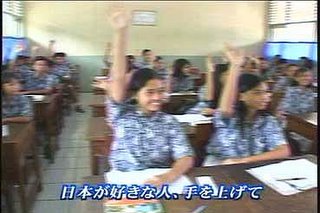 Teacher Nasa: Anyone who likes Japan? (many responded.)
Teacher Nasa: Anyone who likes Japan? (many responded.)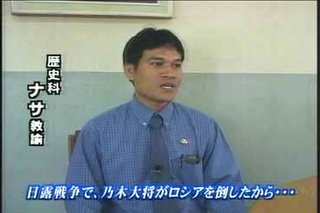 Teacher Nasa: The fact that General Nogi of Imeperial Japan defeated Russia in 1904, in other words, an asian country won against a white country, encouraged Indonesian people at that time. Indonesia may win their independence since Japan did it - this idea led to the preparation for independence. And we did it.
Teacher Nasa: The fact that General Nogi of Imeperial Japan defeated Russia in 1904, in other words, an asian country won against a white country, encouraged Indonesian people at that time. Indonesia may win their independence since Japan did it - this idea led to the preparation for independence. And we did it.Narator: Sukarnoputri, the president of Indnesia, proclaimed their independence Aug. 17 in 1945 just after WWII. However, Dutch troops came back soon, and the independence war lasted over 4 and a half years. Actually, over 800 Japanese soldiers participated in this war. Fujiyama, who is living in Jakarta as a Japanese veteran, joined the independence military instead of going back to Japan.
Staff: Were you asked by Indonesian to join?
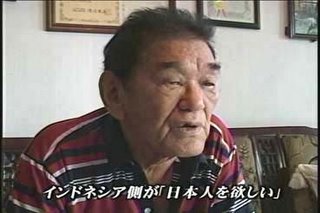 Fujiyama: "We want Japanese soldiers," Indonesian asked me. because we were like mighty god of war for them. I was young and I said OK, let's do it.
Fujiyama: "We want Japanese soldiers," Indonesian asked me. because we were like mighty god of war for them. I was young and I said OK, let's do it. Narator: Miyahara, currently working in a Japanese school in Indonesia, was also one of those who joined the war.
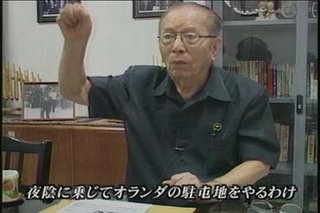 Miyahara: We did a lot of guerillas here and there. A few Japanese soldiers composed 20 to 30 members. We were professional on wars. We ambushed Holland under cover of darkness.
Miyahara: We did a lot of guerillas here and there. A few Japanese soldiers composed 20 to 30 members. We were professional on wars. We ambushed Holland under cover of darkness.Miyahara: It was't a normal war because we didn't have decent weapons. But I was convinced by what they insisted on, "It's our independence war," or "Let's create the Great East Asia Co-prosperity Sphere." It got to my heart.
Fujiyama: Japan got in 350 years of colonial history under Holland and cast in our lot with Indonesian. I want the Japanese educators to teach those facts.
Comments from yellowpeep:
This TV program tells only the bright side of Imperial Japan, apparently. As far as I know, Japan desired to possess interests in Indonesia, and at the same time wanted to take advantage of labors from them. As a result, the rule by Japan left an aspect of harsh exploitation, which caused a number of riots. Thinking about the casualties due to Japan's exploitation up to 1945, it would be hard to describe it as liberation given by Imperial Japan.
I'll upload the rest of the TV program later on. In a meantime, you may want to see other series focusing other countries.
What Japan did in WWII - Malaysia (prologue)
What Japan did in WWII - UK
What Japan did in WWII - Myanmar
What Japan did in WWII - Indonesia
What Japan did in WWII - Taiwan
What Japan did in WWII - Palau
What Japan did in WWII - Korea
What Japan did in WWII - Thailand
What Japan did in WWII - (epilogue)
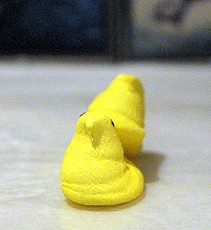

1 Comments:
The Japanese never paid? They paid to Korea, China, Taiwan, Philippine, Indonesia, Vietnam, Myanmar, Laos, Cambodia, Singapore, and Micronesia countries. So you are telling they need to pay more? or you just wanted to show off your ignorance?
Post a Comment
Subscribe to Post Comments [Atom]
<< Home